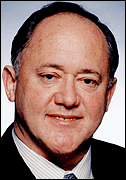

![]()
Pacific Perspective


![]()
Pacific Perspective
Creating the
Pacific CenturyThe Pacific Century, with its promise of prosperity, appeals to idealists, planners, managers, workers and politicians. As a virtual turbo-charger on the engine of economic progress, it gives hope to hundreds of millions still mired in poverty; it engages investors; it excites managers; and it seduces policy-makers. It has also caught our attention in Hawaii. After all, are we not the middle-kingdom of the Pacific Century?
Then there was the economic sinkhole of the early '90s (who knew bubbles created sinkholes?) and the Asian financial crisis of 1997. And now we face the aftermath of 9/11.
Pundits still dream: Orthodox policy gurus argue the Pacific Century is a viable icon, if only the leaders and nations of the Pacific would embrace the free market formula whose recipe includes: trade liberalization, independent central banks, more effective and less profligate government, privatization of state assets, investment in health and education and transparency.
Transparency means no cronyism, no web of influence-peddling through old-boy and family networks, no closet deal-making and no corruption.
But not everyone agrees with this formula. A year or so ago there was a big brouhaha at the World Bank, the high church of growth and development. Among its top policymakers there was real disagreement on the formula. Dissenters rejected the orthodox: one road to Nirvana, and argued different peoples needed to find their own pathway to prosperity. They insisted the orthodox formula was really an Anglo-American style of capitalism.
Last month a world-famous Dutch social scientist, Geert Hofstede, spoke to students and faculty at the College of Business Administration at the University of Hawaii. He said, "Culture Rules!"
What works for America works because it is in harmony with our own cultural values. It is the synergy between cultural values and rules, institutions and ethics that makes for economic growth. Imposing institutions, rules and ethics upon a people whose cultural values are out of sync with those institutions, rules and ethics will not result in prosperity for anyone. Moreover, even when there is synergy between cultural values and institutions et al., prosperity is not a certainty. It only works when there is both a synergy and the institutions and cultural values both desire economic growth as a top priority. To paraphrase Hofstede: There are truths on this side of the Pacific that are falsehoods on the other.
So where does all this leave Hawaii? With an opportunity!
Instead of waiting for the coming of the Pacific Century to bail us out, let us try and add value. We are the best natural cultural laboratory in the world in which to discuss the issue of culture and economics. It is time to bring the best of the best to Hawaii. We need a permanent, informal place where statesmen from around the Asia-Pacific can find retreat and meet with the leading thinkers of the day to begin to tackle the issue of the interaction of culture and economic development. Some may say "We already have this" -- the East-West Center or other such organizations. But this is unfair to these institutions. Their mandate is far broader than the interaction of culture and economic development. What is needed is a new and semi-independent institution focused only upon culture and economic development, and supported by all, especially our visitor industry. The time is right! The place is right! We can add value.
And adding value will be Hawaii's road to the promise of the Pacific Century.
Robert Doktor is professor of management and director of the International Management Doctoral Program at the University of Hawaii.